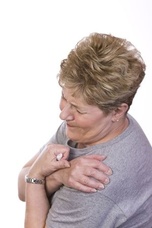
Over the past couple of years I’ve had several middle aged women coming to me for help with frozen shoulder. In all of them, the condition had developed suddenly and for no apparent reason. In some, the pain and stiffness had started in one shoulder, then receded only to come back worse than ever in their opposite shoulder.
None of these women got much help from their doctors. I’m not going to use this post to bag GPs: it’s not appropriate and I believe mostly they do a great job, often in difficult circumstances. But this issue of frozen shoulder in middle aged women is not one that's dealt with well in my experience. And judging from the anecdotal evidence I’ve seen, the link between hormonal changes associated with the menopause and joint stiffness is often not made.
All of the women I have worked with told me that it took some time to even have their problem properly diagnosed and when it was their treatment was usually conservative – painkilling drugs and anti-inflammatories – and not very helpful. Steroid injections were offered to some of these women and, more radically, mobilisation under anaesthetic. Restoration of movement and/or relief from pain was seldom achieved.
If hormonal imbalances, particularly of oestrogen, are a cause of frozen shoulder in middle aged women, it is not at all clear that hormone replacement therapy is the cure. HRT may well help prevent it but once the distinctive symptoms of pain and stiffness are present this form of treatment is likely to be mostly palliative, no small thing for those suffering from this problem. Still, women will have their own view as to whether they wish to undergo HRT.
It's possible to provide relief for this kind of frozen shoulder problem using bodywork. But progress is, literally, painfully slow. Experience seems to show that eventually these problems will resolve on their own so our bodywork solutions may be, like HRT, largely palliative. Risks associated with bodywork are low but care certainly needs to be taken not to make things worse.
Those interested in this subject may find this online forum informative.
All of the women I have worked with told me that it took some time to even have their problem properly diagnosed and when it was their treatment was usually conservative – painkilling drugs and anti-inflammatories – and not very helpful. Steroid injections were offered to some of these women and, more radically, mobilisation under anaesthetic. Restoration of movement and/or relief from pain was seldom achieved.
If hormonal imbalances, particularly of oestrogen, are a cause of frozen shoulder in middle aged women, it is not at all clear that hormone replacement therapy is the cure. HRT may well help prevent it but once the distinctive symptoms of pain and stiffness are present this form of treatment is likely to be mostly palliative, no small thing for those suffering from this problem. Still, women will have their own view as to whether they wish to undergo HRT.
It's possible to provide relief for this kind of frozen shoulder problem using bodywork. But progress is, literally, painfully slow. Experience seems to show that eventually these problems will resolve on their own so our bodywork solutions may be, like HRT, largely palliative. Risks associated with bodywork are low but care certainly needs to be taken not to make things worse.
Those interested in this subject may find this online forum informative.

 RSS Feed
RSS Feed
